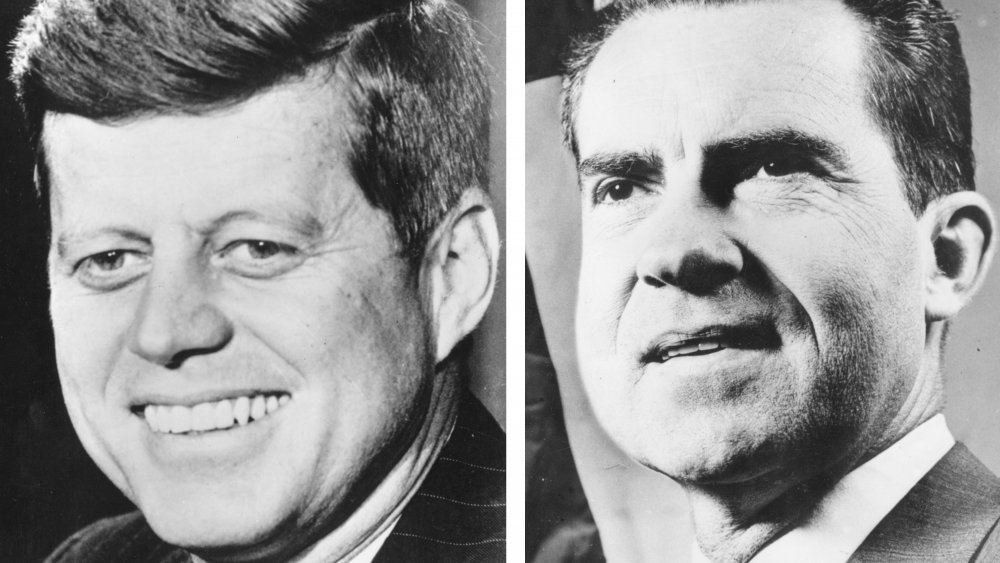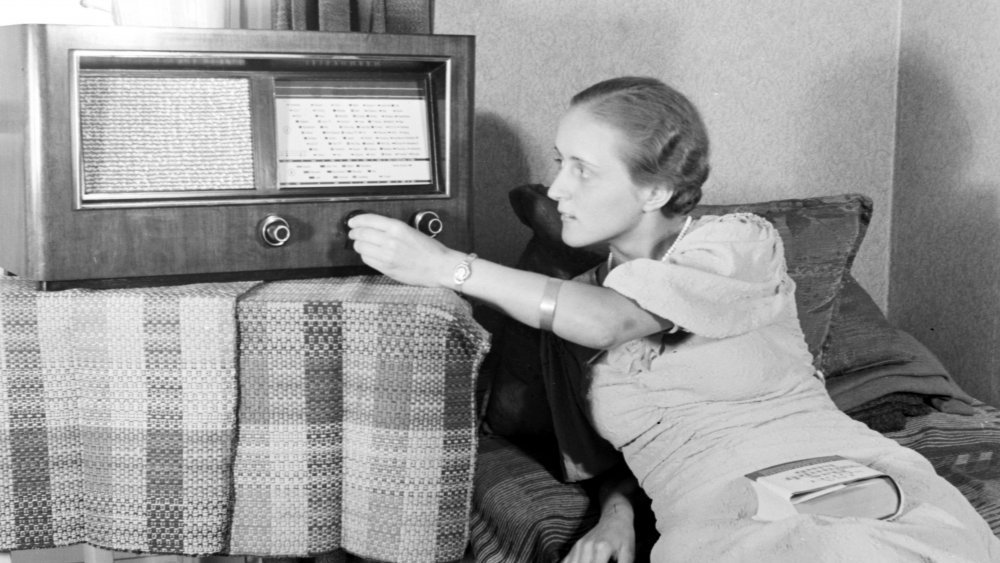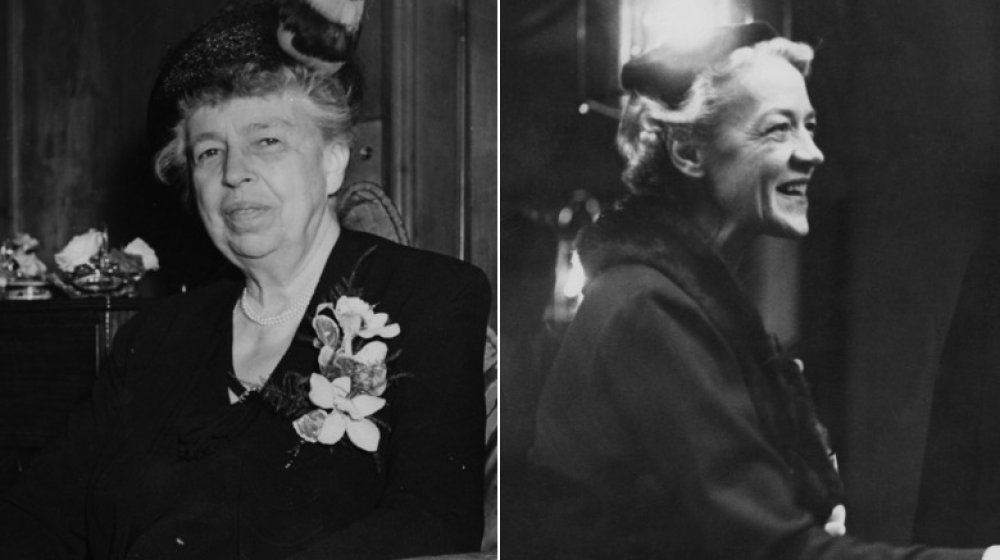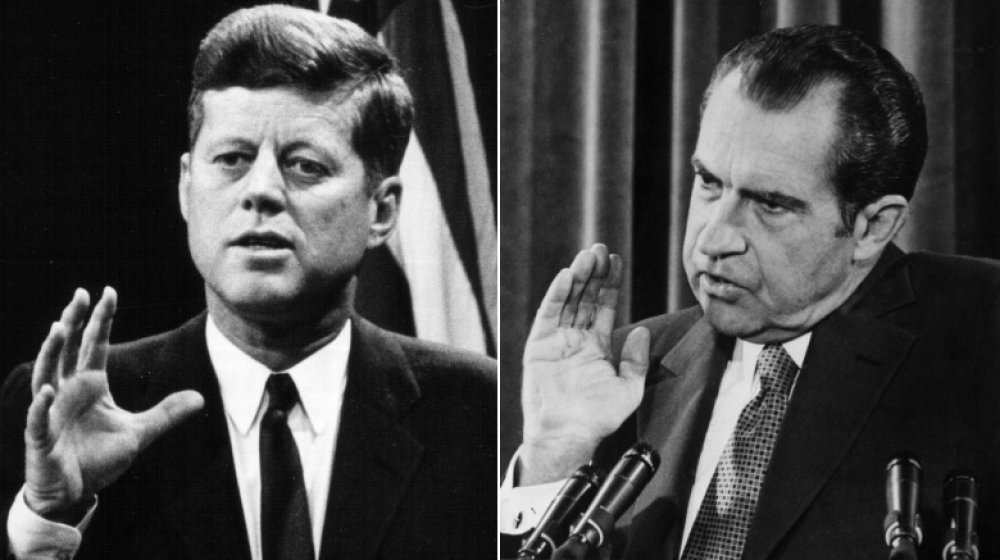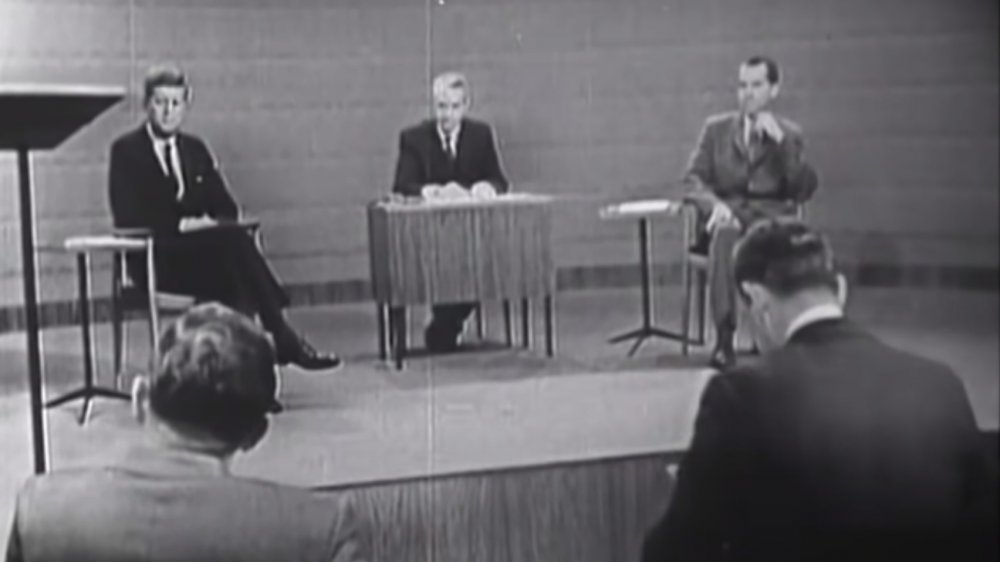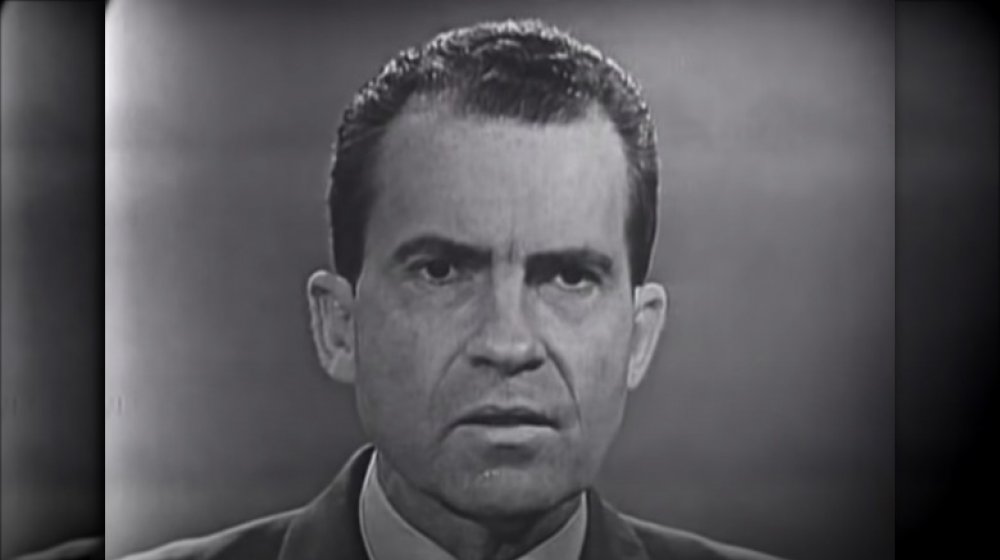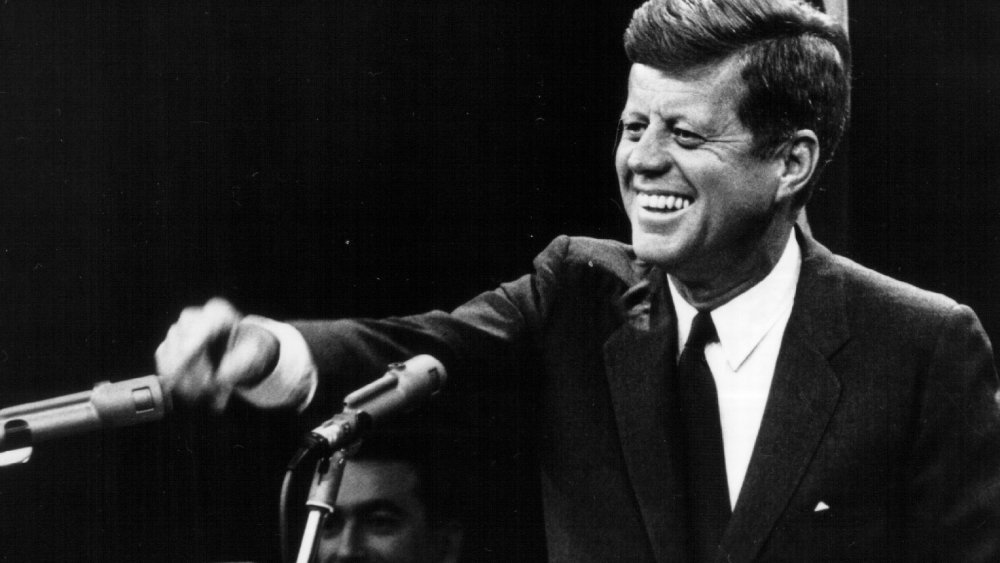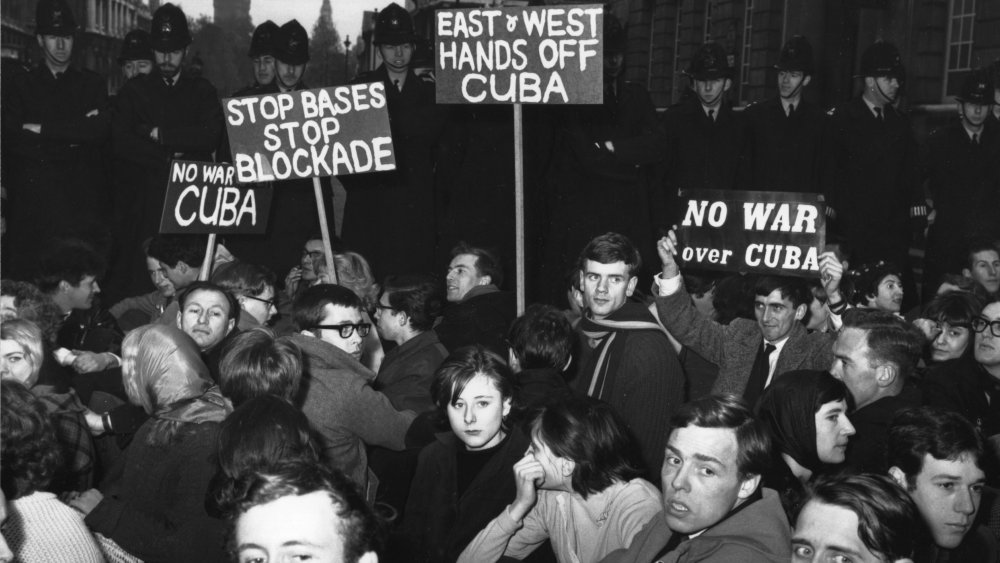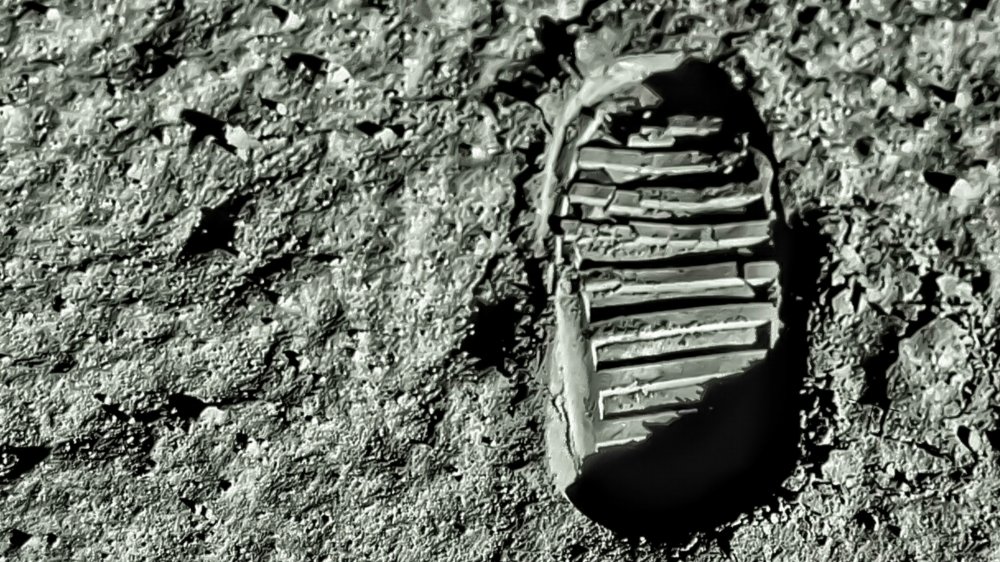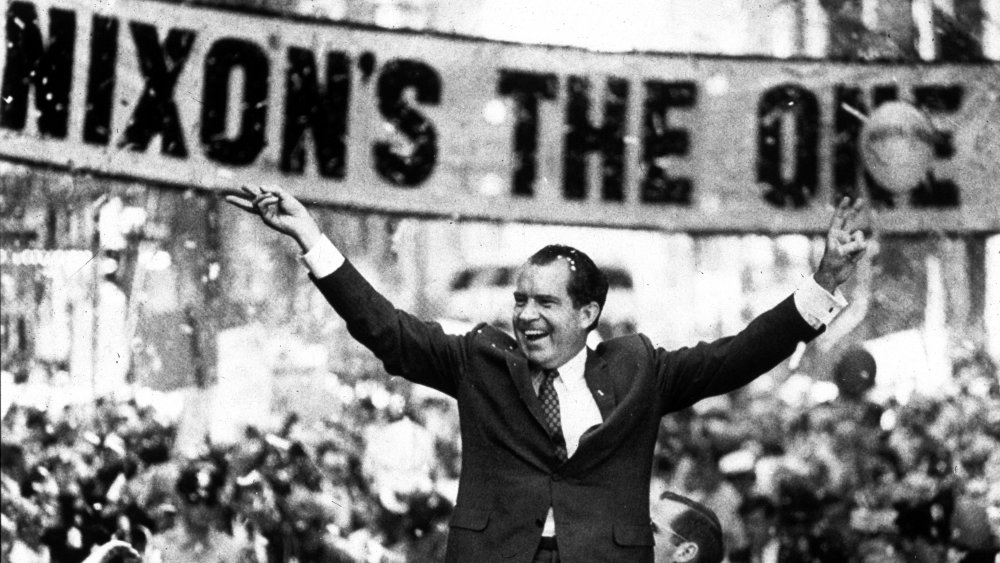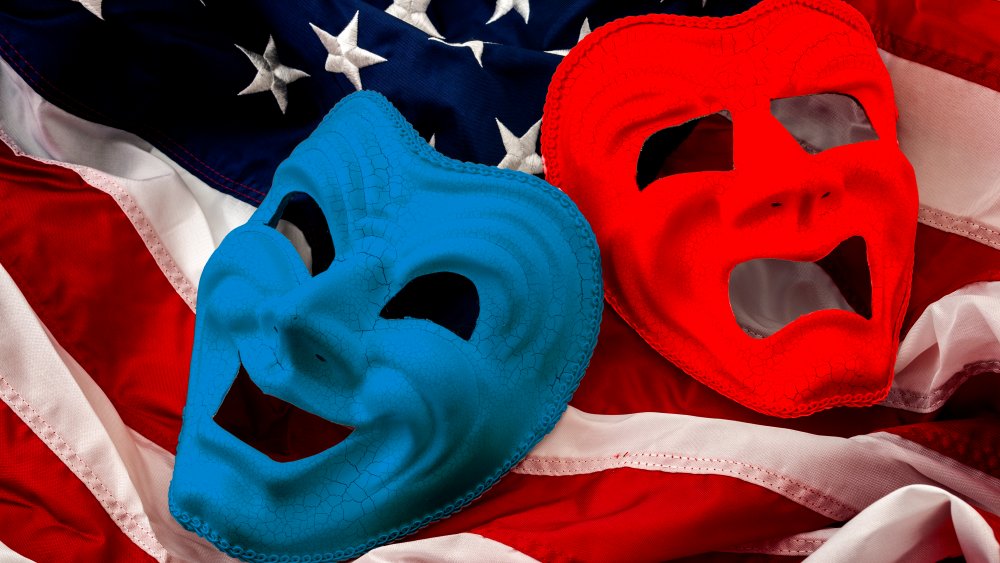How The First Televised Presidential Debate Changed History Forever
In today's cutthroat political era, Americans are used to hearing a lot about elections, and if there's a presidential one coming up in the not-so-distant future? Forget about it — that's all you hear. (By comparison, France's campaign season is generally about two weeks, says NPR, and in Argentina, advertisements kick off 60 days before the election, with actual campaigning starting 25 days after that.)
American politics weren't always like today, and according to CNN, it was the first televised presidential debate that changed a lot about how the public expects a campaign to go. On September 26, 1960, John F. Kennedy and Richard M. Nixon went head-to-head in a medium that had never been used before, and here's the thing: Radio pundits thought the two were pretty evenly matched, but for those who watched it on television, there was no question of who wiped the floor with the other.
We're used to the idea of a televised debate today, but at the time, it was a huge deal — and not everyone thought it was for the best. When the Nixon-Kennedy debate aired, it bumped a beloved sitcom about a small-town sheriff, his struggles to raise his son, and American innocence. And that was significant. Bruce DuMont, president of the Museum of Broadcast Communications, put it this way: "The innocence of the 1950s ended with [the bumping of] The Andy Griffith Show, and the seriousness of the 1960s began with the first Kennedy-Nixon debate."
What did debates look like before TV?
This history of presidential debates is fascinating stuff, and it's worth taking a look at what America was used to seeing in the years before televised debates. According to the Bill of Rights Institute, candidates originally did no campaigning of their own. It was up to their supporters to convince others, and things could get ugly. In the 1800 election, Thomas Jefferson's opponents ran with the idea that his election would fill the country "with the cries of the distressed, the soil ... soaked with blood and the nation black with crimes." Yikes.
In 1858, Abraham Lincoln and Stephen A. Douglas faced off in a debate, and the only way anyone was seeing it was to be there in person. Even then, hearing it was another matter — they didn't exactly have massive sound systems, and Smithsonian Magazine says their words were often drowned out by people in the back shouting and wanting to know what was being said. Anyone who wasn't there read transcripts in the papers, and it wasn't until radio that things changed again.
Even then, candidates knew that when voters got the chance to hear them in real time, it was a big deal. Take FDR. He was known — and loved — for his Fireside Chats, says History, at a time when the country was in a major financial crisis. They were carefully scripted and effectively read, but when FDR was challenged to debate Wendell Willkie, he refused.
The first televised presidential debate wasn't what you think it is
It's time to get technical! The first televised presidential debate didn't involve the candidates at all, and it happened before 1960. The United States Senate says that the very first televised presidential debate was on November 4, 1956. The candidates were Dwight D. Eisenhower and Adlai Stevenson, but both had surrogates taking their place for the debate.
The actual people doing the debating were former First Lady Eleanor Roosevelt (left) for the Democrats and Maine's Senator Margaret Chase Smith (right) for the Republicans.
They very appropriately faced off on the then-new show Face the Nation, and they did it during election crunch time. It was just two days before votes were going to be cast, and most of what they talked about was the ever-confusing subject of foreign policy. Even then, they knew that it wasn't always about what was said — it was about appearance. Smith later wrote in her autobiography (via the New England Historical Society) that she specifically chose things like her hairstyle, lack of a hat, and simple, dark outfit to contrast what she knew Roosevelt would be wearing. By the time the debate was over, no one could say for sure who won, but hers were the footsteps that JFK would walk in just a few years later.
Kennedy and Nixon wrote the playbook
There was one massive change that happened when presidential candidates took to the small screen in order to debate each other: Suddenly, it wasn't just about the words that people read in a paper or listened to on the radio. It was about style, confidence, and charisma, too. Voters were suddenly face-to-face with the person they needed to choose to represent the country, and when you put candidates side by side, it was a chance to choose between what image America wanted to project. When it came time to answering that question, the choice was pretty clear.
JFK, National Geographic says, was well-prepared for the debate. By the time the event rolled around, he'd spent a week prepping in mock debates and practicing exactly what he was going to say. Nixon, on the other hand, didn't entirely have that opportunity: He had just gotten out of the hospital after a three-week stay that had left him gaunt and sickly-looking. In the first of four debates, there was just no contest. Dan Rather, then a young and upcoming journalist, was there and remembered turning to the others in the studio with him that night and saying, "I don't just think Kennedy can win this thing ... I think he just might do it."
Texas A&M history professor Luke Nichter stressed just how much changed during that one debate: "Kennedy was raised in status from just a senator to the same level as a sitting vice president."
By the end of the first televised presidential debate, Kennedy had a clear lead
The infamous Nixon-Kennedy debate it was also broadcast on the radio — and History says there were a lot of people who tuned in that way, too. And that gives us an interesting perspective. Those who were listening to it on the radio, they say, called the whole thing a draw. Both candidates emphasized the same things: national security, building up the military, and taking a firm stand against Communism. Both seemed equally prepared, and both said things that people wanted to hear from their next president.
Looking at them, though, it was a different story. Around 70 million people watched the television broadcast, and among them, they declared Kennedy had won, hands down. What did that mean for the polls?
The National Constitution Center says that before the debate, Nixon was up by six percent. (National Geographic says that Nixon's pick for VP, Henry Cabot Lodge, had told him not to debate because he was so far ahead that his only real option was to lose — there just wasn't a potential benefit.) But this was the first time that many voters were seeing the candidates live, and Nixon — who was already called "Tricky Dick" — came off as so shady that on the day after the debate, Nixon had lost his six-point lead and Kennedy had become the narrow leader. And when he won the election, it was by a similarly narrow margin.
Suddenly, everyone's a doctor
Just how hale and hearty a candidate is: That's a legitimate concern. That first televised presidential debate between Nixon and Kennedy changed the way people started looking at the health of their candidates. Now, they could judge it for themselves, even if they didn't have the full story.
First, Nixon. The gray suit he chose definitely didn't do him any favors, and when he started sweating under the hot studio lights, it made him look even more sickly and pale. It was bad: History says that Chicago mayor Richard J. Daley's response summed it up, as he commented, "My God, they've embalmed him before he even died."
What happened was a perfect storm of factors, including the fact that Nixon had just gotten out of a three-week hospital stay, he'd lost 20 pounds, and he had been convinced to use a powder called Lazy Shave to hide his five o'clock shadow. Add in the fact that he banged his knee (the same knee whose injury and infection had put him in the hospital) as he got out of the car before the debate as well as his recent bout with the flu, and no, he didn't look great.
The viewing public compared him to Kennedy: young, tanned, and healthy-looking. There should have been an important lesson to be learned here, which was the fact that JFK's perpetually bronze complexion was likely caused by his undisclosed Addison's disease. It turns out that you can't always judge a book by its cover, after all.
TV has made the presidential race about personality
Quick, which can you describe better, your presidential candidate of choice's policies or personality?
Let's take the party prep that was going on before the 2020 election. Jessica Flanigan, an assistant professor at the University of Richmond, says (via The Conversation) that the Democrats had a big problem: They needed to consider what candidate had the "charisma" to beat sitting president Donald Trump. The problem? She wrote: "[...] focusing on charisma is a terrible idea." Why? For the simple fact that likeability has nothing to do with a person's ability to lead and govern.
Just how focused on personality have we become? Vox reported on a study done on the ads that both Trump and Hilary Clinton ran in 2016. They found that only 25 percent of Clinton's ads went after Trump based on policy, not personality. Previous presidential candidates tended to devote at least 40 percent of their advertising to going after policy.
CNN calls it "cosmetic politics," and the idea that television would turn a presidential election into a different kind of popularity contest was recognized immediately. At the time of the 1960 debate, historian Henry Steele Commager summed it up best and wrote that he hoped TV debates would never be used because, "The present formula of TV debate is designed to corrupt the public judgement and eventually, the whole political process. The American presidency is too great an office to be subjected to the indignity of this technique."
The conflict with Cuba during a Nixon presidency would have looked very different
The first televised presidential debate changed the way candidates appealed to the American public, but it was also a deciding factor in a very close race — and ultimately, in a close victory. It also ended up shaping the world.
Ted Sorensen was Kennedy's speechwriter and later told Time that they had no idea how important a moment it was. He also speculated that Kennedy's ultimate win changed the course of the 1960s and, by extension, the world — particularly when it came to Cuba and the Soviet Union. When Kennedy was advised to respond to Soviet missiles in Cuba with some serious military might, he declined. If it had been Nixon, things might have turned out differently.
"Had [Nixon] done as the Joint Chiefs urged it would have started a nuclear war from which nobody would have survived," Sorensen said. "I think we should certainly be grateful that John F. Kennedy won that debate."
Sorensen might not be an impartial judge, but he's not the only one who believed the situation in Cuba would have gone decidedly sideways if Nixon had been calling the shots. Harvey Simon wrote an entire alternate history book exploring that very question and said (via History News Network), "I believe Nixon would have been looking for a pretext for a full-scale military invasion and would have seen the missiles as the perfect excuse..."
Some incredible moments in history would have looked very different if Nixon had won
Kennedy's presidency ended up being very short, but he packed a lot into those few years in office. You could argue that without that first televised presidential debate, he might not have taken office, and if that had happened? Things may have turned out pretty differently, starting with the space race.
It was Kennedy, after all, who made the promise that NASA was going to put a man on the Moon by the end of the decade, and they did. And while it's true that Nixon was president by then and supported the Moon landing program throughout his term, CNN notes that he ultimately backed budgets that canceled the last of the scheduled Apollo missions.
They also argue that there would have been no Watergate. When Nixon lost to JFK, he was convinced they were playing dirty. Whether or not that's true, experts — like historian and author Evan Thomas — suggest that if he had won in 1960, he wouldn't have been so paranoid that he took the chances that ultimately led to Watergate, his disgrace, and a sharp decline in America's trust in their leadership.
And finally, it's also argued that if JFK hadn't won the presidency, it's likely he wouldn't have become a target for assassination. While it's impossible to tell what he would have achieved if he had survived, experts do speculate that there would have been some serious scandals hitting the headlines.
The consequences of the first televised presidential debate were immediately recognized
It's easy to look back at history and draw lines between events that we can now tell are connected — it's why they say that hindsight is 20/20. But when it came to debates on live television, it didn't take long for politicians to realize they had a reason to be wary of debating their opponents on a forum that allowed voters to not only hear what they had to say but see their faces as they said it.
Northeastern University professor and media historian Alan Schroeder says (via Time) that up until the Nixon-Kennedy debate, "[Television] was very much an entertainment medium. It wasn't a place for serious discourse." While the debate did help make television a legit source for more than just entertainment, it took a while — at least, as far as debates were concerned. The next one didn't happen for another 16 years.
In 1964, Lyndon B. Johnson made it clear that he'd learned a very important lesson, and he outright refused to debate Barry Goldwater. Then, Nixon did the old "fool me once" thing and refused to go back on television in both 1968 and in 1972. It wasn't until 1976 that the next presidential debate was held, between Jimmy Carter and Gerald Ford. Since then, they've been a regular part of campaigning.
How much of an impact do televised presidential debates really have today?
Since Carter and Ford faced off in 1976, presidential debates are pretty much standard operating procedure for US elections, but how much of an impact do they really have in helping people decide who they're going to vote for?
It's ... debated. In 1996, The New York Times ran a piece that said a decades-old survey done by the University of Michigan Survey Research Center found that in the 1960s, about 60 percent of voters got the majority of their information regarding elections from the television. They also found that a one-sided campaign invariably turned people away from that one side: They wanted the back-and-forth.
But the numbers suggest otherwise. According to The Economist, an academic study that looked at elections between 1960 and 2008 found that polls taken a week before presidential debates were suspiciously similar to those taken a week after.
Then, take some of the numbers that come from Pew Research. They found that in some years — like 1992, when voters had to choose between George H.W. Bush, Bill Clinton, and Ross Perot — 70 percent of voters said the debates helped them make a choice. But then, look at 2016. That year, only ten percent of voters made up their minds in the weeks around the debates, and 42 percent knew who they were voting for before the conventions. Bottom line? The debates are sometimes helpful but not always definitive ... and in the world of politics, who the heck really knows?
